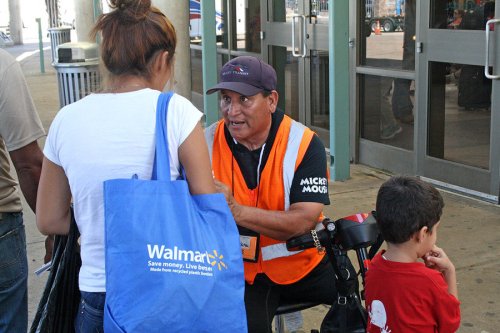
Photo: Henry Gass/Christian Science Monitor
Volunteers like Luis Guerrero, pictured above, reach out to migrants — after they are released from federal custody and their cases are proceeding — and help them to reunite with families around the country and get legal assistance.
At the end of 7th grade, after we had had a half year each of Spanish and French to get a taste, the Spanish teacher took me aside and begged me to take Spanish in 8th grade and not French. I spouted what my parents told me about French having more great literature, and the teacher was shocked at my ignorance. Still, I wasn’t one to go against my mother.
Today I think if only I could speak Spanish, maybe I could actually be some help as a volunteer at the border — like the people in this story.
The Christian Science Monitor writes, “At the U.S.-Mexico border, our reporter found an army of everyday citizens compelled to offer help where officials cannot.”
Henry Gass, the reporter, writes, “Luis Guerrero has been going to the central bus station here for six years now. He still hasn’t bought himself a ticket.
“It started when he saw a nun trying to help newly arrived migrants passing through the station and offered to translate for her. The migrants have kept coming, so he has kept making the ride to the station.
“Of course, migrants are crossing into this part of Texas in numbers not seen in over a decade. U.S. Customs and Border Protection (CBP) has already apprehended more migrants in the Rio Grande Valley sector this fiscal year than any other year this century besides 2014. Mr. Guerrero has responded to this latest surge with the calm enthusiasm of a retired firefighter who rescued children from a submerged school bus three decades ago. …
“The zero tolerance policy is no more, but the flow of migrants – primarily families from the Northern Triangle of Central America – has only increased. News and government reports of migrant deaths, as well as ‘dangerous’ and ‘squalid’ conditions in government holding centers, have thrust the issues back into the national spotlight in recent weeks. …
“Immigration lawyers, local officials, and volunteers across the border [have] been feeling the strain.
“Bus stations have been a consistent area of need, and that is where Juanita Salazar Lamb found herself this week after driving down to McAllen from Benton County in northwest Arkansas. She had been following the news coverage of the border crisis, unsure of whom to believe – people who say the migrants need asylum, or people who say they’re exploiting loopholes in immigration law; people who say they’re being treated horribly, or people who say they’re being treated well. …
“Thirteen months ago [Joyce Hamilton] and four friends formed a group, Angry Tias and Abuelas, focused on helping migrants on international bridges and reuniting separated families. The group expanded to a core of eight regular volunteers, and six months ago got a fiscal sponsorship from an Austin-based nonprofit (so it can attract donors even though it’s not yet recognized as a tax-exempt organization).
“ ‘By August [2018] I just really, I didn’t feel like I had a center. I was just shaky a lot,’ she says of the toll her work has taken over the past year.
“As government policies have changed, the group has had to shift where it devotes resources. … In January the administration began implementing Migrant Protection Protocols, a policy also being challenged in court in which migrants may be returned to Mexico while their immigration case is proceeding.
“International bridges are now mostly empty, while shelters in Mexican border cities are overwhelmed with migrants. Ms. Hamilton’s group is now focused on helping at the bus stations and sending money and supplies to shelters in Mexico. …
“Things have slowed down recently in her hometown of Harlingen, Texas. When she arrived at the local bus station on Monday morning – a station so busy on some days this summer she couldn’t hear herself talk – there was only one Guatemalan girl. It was her 18th birthday, so she had been released from the Norma Linda child detention center nearby and dropped off there.
“The girl’s bus ticket – to Georgia, where she says her uncle lives – was for the next day, so Ms. Hamilton arranged for her to spend the night at Loaves & Fishes, a homeless shelter in Harlingen. The 18-year-old says she hopes to work in the U.S. and send back money to support her parents still living in rural Guatemala. After she had crossed the border into Arizona, she spent eight months in Norma Linda, an experience she had only a few complaints about.
“ ‘There were lots of rules,’ she said in Spanish, fidgeting with a bracelet she had made at Norma Linda bearing the names of her grandparents.
“ ‘I made a couple of friends,’ she added. ‘I’m going to miss them.’ ”
As a colleague at my last job used to say about migrants who had made the trek, “People who go through all that sound like the kind of people I would like to know.”
More at the Christian Science Monitor, here.

I have the same wish that I had taken Spanish so I could be some help. We are so close to Quebec here, 15 miles, that we all got pushed into French.
In my ESL volunteering, I have found that French can be useful with Haitians. They often say they speak Haitian Creole, not French, but if you try using French, they always understand.